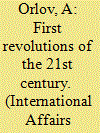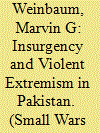| Srl | Item |
| 1 |
ID:
107096


|
|
|
|
|
| Publication |
2011.
|
| Summary/Abstract |
THE PROTEST WAVE that started in Tunisia in January has spread to a significant part of the Middle East and North Africa. To some degree or other, it has affected about 10 states with ruling regimes collapsing in two countries (as of press time) and with three being in an exclusively difficult situation, fraught with collapse. When, not so long ago, mankind was joyfully seeing in the New Year, 2011, no one even had an inkling of an imminent large-scale upheaval in the Arab world. So the legitimate question is: What happened next and how should the ongoing developments in this volatile part of the world be defined?
|
|
|
|
|
|
|
|
|
|
|
|
|
|
|
|
| 2 |
ID:
126091


|
|
|
|
|
| Publication |
2013.
|
| Summary/Abstract |
In 1971, India intervened militarily on behalf of Bengalis in the civil war in East Pakistan, dividing the country into two. The prospect of another civil war in Pakistan pitting radical Islamists against the secular but authoritarian military raises questions about the possibility, timing, objective, and nature of another Indian intervention.
This commentary argues that history is unlikely to repeat itself. Indians, Pakistanis, and foreign observers have overstated the strategic boldness of the Indian decision to invade East Pakistan in 1971; the invasion was far more reactive and limited. The conditions in Pakistan today are dramatically different from the past, making a similar invasion improbable. First, unlike the Bengalis in East Pakistan, India does not have a natural ally in a conflict between radical Islamists and the authoritarian Pakistan army. Indeed, most Indians see the two sides as allied rather than inimical, and the conflict between them as the result of American presence in the region. Once that casus belli is removed-as President Obama has promised-the two sides will rejoin and refocus on India.
Second, refugees from a civil war in Pakistan today are unlikely to head into India as they had from East Pakistan. East Pakistani refugees were significantly Hindu and the flood plains of Bengal much easier to cross than the mountains of Kashmir or the deserts of Sind-Rajasthan.
|
|
|
|
|
|
|
|
|
|
|
|
|
|
|
|
| 3 |
ID:
152016


|
|
|
|
|
| Summary/Abstract |
Pakistan has an uneven history of dealing with insurgencies and extremism. This article identifies the various campaigns and policies employed to defeat militants and deal with violent extremism. It describes the major anti-state groups and how Pakistan’s military and civilian leaders, relying on the related strategies of selectivity, gradualism and containment, have allowed militancy and terrorism to thrive. This article finds that while the elites and the public may have belatedly come to appreciate the existential internal threats these groups pose to the country, there are strong reasons to doubt the state’s full commitment to its promises to take meaningful action.
|
|
|
|
|
|
|
|
|
|
|
|
|
|
|
|